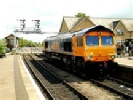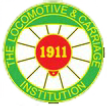Archive Section




An account of the lecture by John Smith, Managing Director of GB Rail Freight on Tuesday 4th December 2001.
Written by John Lunn.
John Smith started his talk with a brief summary of his railway career: Having started in 1977 as an apprentice fitter at York Works working on Class 313 EMUs, he transferred to become a technician apprentice. This move took him to Doncaster Works where he worked on Deltics.
The move out into the cold world took John to Anglia/Gatwick Express via a route which took in a number of T.M.D's (Traction Maintenance Depots), the Crewe area modernisation and secondary door locking, which was instigated following on from a Brighton Guard failing from a Cross Country train at Slough. All this helped John Smiths career to expand into thoughts of Safety and Risk Assessments. He then moved to Wembley Maintenance Depot where he was put in the unenviable job of having to close the Depot. After Wembley he moved to the Anglia TOU where John took up the job as Traction & Train Crew Manager and became involved in the management buyout of what would become the Anglia Franchise.
Seemingly, against the odds GB Rail, won the franchise on the back of a number of service investment proposals, chief amongst these being the 30 minute service on the Liverpool Street -
GB was set up by two major shareholders, both Canadians from the world of business finance and with the main board made up by businessmen. Initial open access plans under GB Rail looked at: Bedford -
In the meantime the new Class 170's DMUs (to achieve the franchise commitment for new trains) were very late arriving from the manufactures, this in turn was putting the proposed 30 minutes service to Norwich in jeopardy. As as stop-
The first Open Access Passenger Service was the Hull -
Freight:
Establishing GB Rail Freight (GBRf) was not without its problems, whilst operating open access freight services should only required a safety case and some pathways, problems with using yards owned by other operators have arisen. John stated that EWS, whilst problematic in some areas, have been helpful to GBRf in others, such as locomotive commissioning. Ordering Locomotives also presented problems, an approach to Brush was not successful so the order for 7 Class 66 locomotives went to General Motors. These locomotive were delivered just four days late 18 months after the order was placed, the four day late delivery being due to a storm during the delivery Atlantic Crossing. A further order for 5 more Locomotives has been placed with GM for delivery in June 2002. All the locomotives are maintained by WestCoast Train Care at Willesden Depot.
GBRf has found that freight customers are not happy with the services on offer from EWS and other operators, because they are more concerned and busy looking a problems of running a railway instead of looking at what the customer wants and addressing them. Traffic won from EWS includes a number of stone flows and moves are being made to enter the container-
You may also be interested in the lecture “Turnover is vanity, Profit is sanity, also by John Smith, delivered to the Institution on 03/04/2012